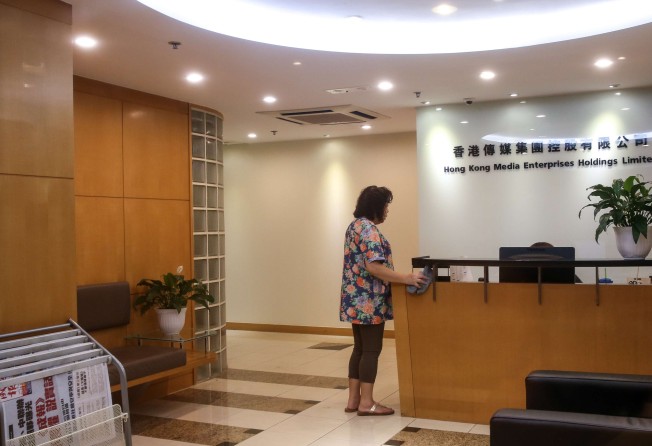Sing Pao chief in Hong Kong had multiple ID cards when arrested, pro-Beijing newspaper claims
Attacks on chairman of media company linked to paper’s editorial criticising Chief Executive Leung Chun-ying over luggage row

Pro-Beijing newspapers in Hong Kong attacked Sing Pao newspaper chief Gu Zhuoheng for a second day on Thursday in what was seen as an orchestrated campaign.
Gu has hit back and claimed he was targeted for refusing to submit to a “certain power”.
Chinese-language daily Ta Kung Pao ran a full-page report accusing the chairman of Sing Pao Media Enterprises of having a murky background. Gu was allegedly on the run overseas, according to reports.
Ta Kung Pao said Gu had multiple identity documents in his possession when he was detained at Shenzhen airport two years ago on suspicion of illegal deposit-taking in connection with a fraud case about an online financing platform called cnmeidia.com.
The report claimed that Gu had at least three military officer identity cards and two identity cards with different names, dates of birth, and addresses on them.
Two Beijing mouthpieces, Wen Wei Po and Hong Kong Commercial Daily, also ran reports giving details of the cnmeidai.com case, which came to light last year when two senior officials disappeared with hundreds of millions in funds. The reports named Gu as the man behind the operation.
The newspapers said the pair were arrested and jailed in May by a Shenzhen court for illegally taking deposits from the public.
It is understood that Beijing’s liaison office in Hong Kong had started keeping an eye on Sing Pao Daily News since the newspaper ran an editorial in April criticising Chief Executive Leung Chun-ying over an incident involving his daughter at the airport.
Leung was accused of pressuring airport staff to deliver a bag she left at check-in to a boarding gate. The editorial said Leung’s handling of the case had given the public the impression that he had abused his power. Leung had denied such criticism.
A source said the liaison office had approached Sing Pao’s management after the chief executive allegedly complained to the office that he was not happy about it.
The office had not paid much attention to the paper’s coverage before because of its relatively small circulation. But the editorial on “luggage-gate” and the subsequent commentaries that criticised Leung had caused a stir.
A spokesman for the Chief Executive’s Office was unavailable for comment.
Professor Leung Tin-wai, head of journalism and communication at Shue Yan University, said: “One can’t help but think that it is part of a power struggle between two rival factions in the Beijing leadership.”
The academic, a veteran media man, added: “Sing Pao is going to lose the fight this time. But Beijing is going to lose the battle. The saga has exposed to the public that Beijing has been very much eager to control what Hong Kong media run.”
The newspaper, known for its conservative editorial policy, raised eyebrows on Tuesday with a full-page commentary accusing the chief executive of indirectly encouraging Hong Kong independence talk so as to justify the authority of his governance and its hawkish faction.
Leung has made a series of high-profile attacks against advocates of independence, prompting his critics to charge that he had provoked even more intense debate.
The commentary claimed the liaison office was a major force of support for the chief executive. It said Hong Kong could “continue to suffer nightmares” if Leung was elected for a second term.
The commentary urged the Central Commission for Discipline Inspection to investigate the liaison office.